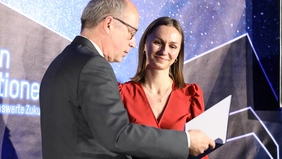The clothes are fair trade, the coffee too - at least that's what the seal printed on the products suggests. But does such information influence our purchasing decisions? That's what Marina Eichinger, a graduate of the THI Business School's Marketing / Sales / Media master's program, investigated in her master's thesis. It was so outstanding that Eichinger was awarded the prize for the best thesis related to internationality 2021 at THI's Academic Celebration. The award, worth 1,000 euros, was presented by Prof. Dr. Andreas Manseck of the Lions Club Ingolstadt. Eichinger's thesis is entitled "The Significance and Impact of Ethical Product Information in the Food and Clothing Sector. An empirical analysis among consumers in Germany and the United States." Her project was supervised by Prof. Dr. Marc Knoppe, Professor of International Trade Management, Strategic Marketing and Innovation Management.
Taking responsibility for the environment, fellow human beings and animals has become increasingly important for many consumers in recent years. In their own consumption, however, the hunt for bargains tends to be in the foreground - whether products are then produced in a fair, environmentally friendly or sustainable manner seems to be of secondary importance. Researchers speak of the "attitude-behavior gap." Eichinger therefore wanted to find out whether ethical product information has any influence at all on the purchase decision and, if so, what effect it has.
With the help of a quantitative online survey, Eichinger discovered that consumers in Germany and the U.S. attribute moderate to medium importance to the majority of ethical product information. This is why this information does not usually lead to an increase in the likelihood of purchase. The purely factual communication of ethical product information thus does not contribute to closing the attitude-behavior gap.
Eichinger's findings have also been incorporated into a scientific article on the topic of "Product Information as an Innovative Raw Material of Digitalization." The article will soon appear in the new edited volume "Der zukunftsfähige Handel" (ed.: Marc Knoppe, Stefan Rock, Martin Wild).


![[Translate to English:] Logo Akkreditierungsrat: Systemakkreditiert](/fileadmin/_processed_/2/8/csm_AR-Siegel_Systemakkreditierung_bc4ea3377d.webp)








![[Translate to English:] Logo IHK Ausbildungsbetrieb 2023](/fileadmin/_processed_/6/0/csm_IHK_Ausbildungsbetrieb_digital_2023_6850f47537.webp)


